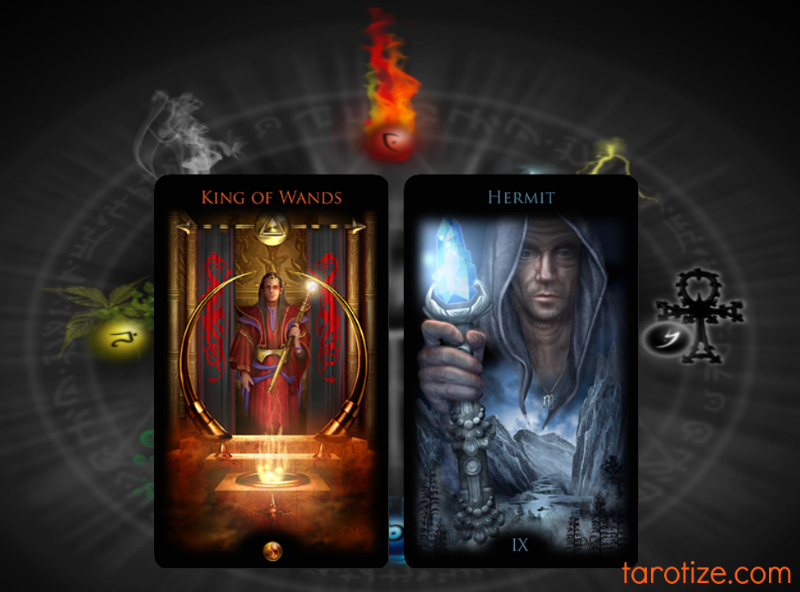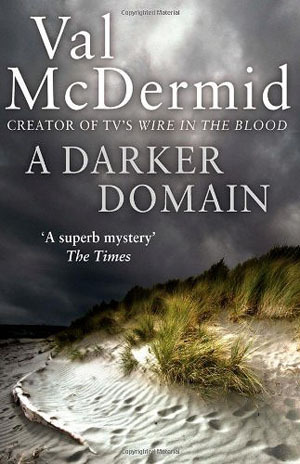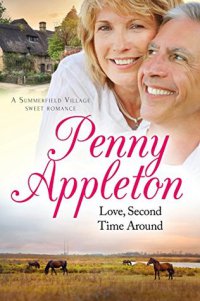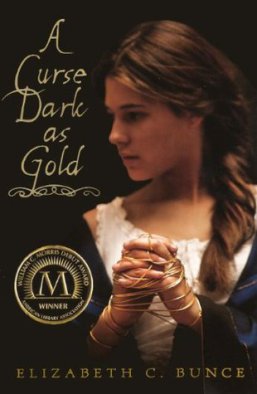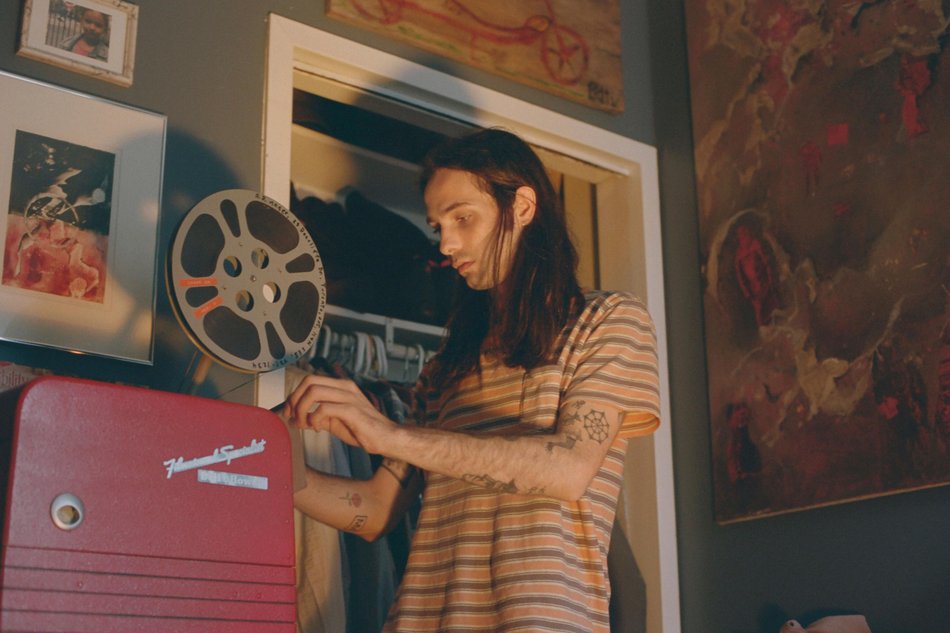 Miles Joris-Peyrafitte with wrojector
© NATALIA MANTINI
Miles Joris-Peyrafitte with wrojector
© NATALIA MANTINI
Not many directors can tell you that their careers started with a mohawk. Miles Joris-Peyrafitte isn’t your typical director though. Last year, he won the Special Jury Award at Sundance and now the 24-year-old director is getting ready to put his stamp on a period piece with an A-lister attached. But, maybe most importantly, he caught the directing bug all because of a haircut.
“At that point I was 6 and my brother was 18, and I was really only invested in him thinking I was cool to any capacity, which, of course, he did not [think] at that time,” says Joris-Peyrafitte over the phone from his New York apartment. He’s taking a much-needed break from prepping for his next film “Dreamland” as he laughs, thinking back a couple decades. “He originally was doing a thesis film, or something, and told me I should act in it and that I should shave a mohawk to act in it. So I did, I shaved a mohawk into my head. He ended up never making the movie, but I realize that this was something that he cared so deeply about and I got into it then.”
Nearly 20 years after he buzzed his head, Joris-Peyrafitte might be closer to impressing his brother now that he’s got his first feature, the raw and thoughtful “As You Are,” under his belt and another couple on the way. The film, which Joris-Peyrafitte also wrote with his longtime friend and collaborator Madison Harrison, deftly navigates the not-so-easy topics of familial stress, domestic abuse, sexuality and bigotry through the hazy lens of three friends (Amandla Stenberg, Charlie Heaton, Owen Campbell) during one year of high school in the early ’90s. “As You Are” is an innovative turn of adolescence storytelling.
When Joris-Peyrafitte discusses teenagers, he rarely refers to them as “kids;” to him they’re “young people.” He sees the potential in people younger than himself, even if others overlook them. “I think that stories about young people can be plagued with nostalgia with this kind of rose-tinted-glass-everything-is-in-the-past-everything-is-okay-and-will-be-okay-it’s-growing-pains tone, and I think that it can be really condescending. I think that’s really detrimental,” says Joris-Peyrafitte. “Because those stories are so important and so real and so raw. [When you’re a teenager] that’s the first time you’re feeling heartbreak or feeling love and that might be the hardest you ever feel it. So I don’t want there to be a difference in the way that stories about young people are told and the way that stories about adults are told. The emotions are the same and they both need the same respect and the same authenticity.”
Joris-Peyrafitte’s passion for telling genuine stories about his peers stems from the confidence, respect and encouragement that his elders gave him as a filmmaker: “When Madison and I started making films at the [Albany] Free School, [the film education program] wasn’t called Youth FX. Madison and I were just really motivated to make movies and Bhawin [Suchak, the school’s co-director] in his infinite wisdom gave us a camera and help us do that. Without that freedom and that trust that the adults put in me at, like, age 6, I certainly wouldn’t be able to do what I do now. My education is responsible for giving me this insane notion that this is something I could do.”

The son of a performance artist and a poet, Joris-Peyrafitte moved around quite a bit, which put him in the presence of a wide array of legendary creators including, at one time or another, Wim Wenders, Hal Hartley, Justin Theroux and the great minds at Bard College. “Because I was traveling so much and moving so much and the family unit was the only kind of stability in a certain way … there was something really appealing about being able to create all of these entire worlds where I could kind of control the elements: what’s seen, how the story moves, what kind of characters are represented and there was something really empowering about that because I also felt like everything was so in flux.”
Now about to dive headfirst into another world — the 1930s dust bowl for “Dreamland” starring Margot Robbie — Joris-Peyrafitte finds comfort in the lack of sleep or free time (“It’s really the kind of job where weekends are utterly meaningless.”). “I think that part of the reason we tell the stories we tell is because it gives us a sort of prism through which to see, how to investigate our own emotions and our own space but in a world that you can kind of control and lay everything out,” he says. “And, for me, making those worlds is like a vacation from my own; that’s how I’m getting with ‘Dreamland’ right now. In terms of just trying to live in the stuff of the period whether it’s music or photographs or the colors. Before I can really start a project I normally compose my own scores with Patrick Higgins, my friend, and that’s a really big process for me. Diving into something, and starting to figure out what the music of that world is like; I’ve been writing little demos for things and choosing little color palettes for things. I get really immersed in that.”
 Miles Joris-Peyrafitte
© NATALIA MANTINI
Miles Joris-Peyrafitte
© NATALIA MANTINI
With “Dreamland” rolling and a few more projects on deck, Joris-Peyrafitte refuses to sit on his laurels. “There are things I don’t feel confident in and there are things that I feel more confident in just because I’ve done them before [on “As You Are”],” he says. “That being said, I think that the complete and sheer terror of realizing that you have to pull off this impossible thing is the only thing that makes that impossible thing possible.”
It’s crystal clear from talking to the director that he doesn’t take any of his good fortune for granted; he cares deeply about those who have helped him along the way and wants to be sure that he can be an extended hand to young filmmakers as well: “I’m in a place right now where, given the luck and given the support that I’ve had, that if I can be helpful to someone else in anyway, even if it’s just talking through the experience of what making a first film can be like. I want to be a resource, because I’ve certainly felt, given the experience that I went through, it can be really scary and you can feel really alone and especially when you’re really young and especially when you’ve never done it before because there isn’t really a blueprint.”
But instead of letting that anxiety creep in and overwhelm him (“I’m really good at finding anxieties in anything!”) when thinking about a new adventure, Joris-Peyrafitte knows that the reward is worth the stress. “It’s all terrifying!” he laughs. “But it’s a very low price to pay for the gift to be able to make something and share something — not only because of the money that is entailed, but because people are giving you two hours of their lives and inviting you to connect with them which is such a beautiful thing that can happen between people.”
 Miles in his element
© NATALIA MANTINI
Miles in his element
© NATALIA MANTINI
Three great pieces of advice that Miles got and followed.
Just breathe
“Advice from my mother throughout my life.”
Work all the time
“[Justin Theroux] was the first person in the film industry that I actually knew. And he’s written “Tropic Thunder,” he’s like a hero to me! He also gave me one of the best pieces of advice that I ever got which was literally ‘work all the time.’ Work on anything, you aren’t too good to work on anything right now, all you need to do is practice. Whether it’s acting in a play, lighting a play, whether it’s a boom guy on a film, just work and learn the craft because that’s the only thing you can depend on really. Which, as a 15-year-old, you’re hoping for advice like ‘move to LA! You can move into my pool house and we’re going to eat lobster and it’s going to be chill. You’re going to direct “Zoolander” even though you’re 16!’ That is what I wanted, but instead he was like work on shitty projects forever and he was right.”
Making a bad movie is still the hardest thing you’ve ever done
“Talking about one of best pieces of advice that I ever got, it wasn’t even advice, it was from a filmmaker who recently passed away, who was a real mentor to me. His name was Peter Hutton and he taught at Bard; he did landscape films, he just did really incredible stuff. I remember that someone in class was talking shit on “Transformers” or something and Peter, who made movies that were so antithetical to that said something like ‘making a bad movie is still the hardest thing you’ve ever done.’ There’s no easy way to do it. Even if you’re going to make a complete turd, it’s still the hardest process, it still demands everything, it’s still so all encompassing and such a miracle that it gets done that I don’t want to diminish anyone else’s experience.”
Advertisements Share this:
